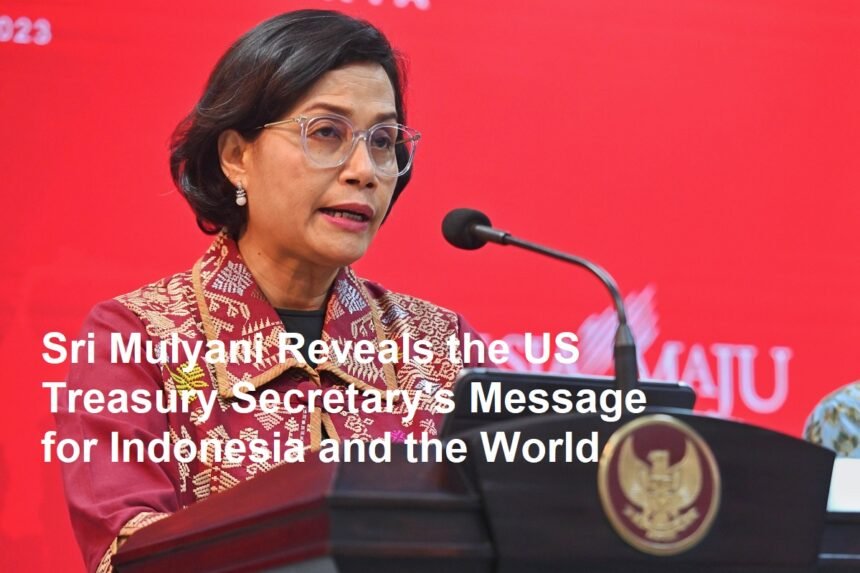The recent interaction between Indonesia’s Finance Minister Sri Mulyani and the United States Treasury Secretary has brought to light important messages regarding global economic cooperation and trade relations. This dialogue reflects the evolving dynamics of international economic governance amid shifting geopolitical and trade landscapes. The message from the US Treasury Secretary to Indonesia and the world underscores the strategic importance of multilateral cooperation, trade negotiations, and leadership in global financial institutions.
Indonesia and the United States have a longstanding economic relationship, with trade and investment playing key roles. Recently, Indonesia has taken proactive steps to initiate formal trade discussions with the US, a move that has been positively received by the US Treasury. This development signals a mutual interest in strengthening economic ties and enhancing cooperation in trade policies. The US emphasizes reciprocal trade agreements and collaboration within multilateral frameworks, aiming to foster a balanced and fair global trade environment. Indonesia’s engagement is significant as it positions itself as a key economic player in Southeast Asia, navigating complex relations with major global powers.
The global trade environment is currently experiencing significant shifts, particularly due to recent US tariff policies and broader geopolitical tensions. Sri Mulyani highlighted the potential disruption these changes could cause in the global trade order. The US aims to maintain its leadership role in international financial institutions such as the World Bank and the International Monetary Fund (IMF), leveraging these platforms to advance its strategic economic interests. This evolving trade landscape is characterized by increased competition and geopolitical maneuvering, where economic policies are closely linked to national security and global influence.
During the meeting, the US Treasury Secretary praised Indonesia’s positive and proactive stance in initiating trade talks, recognizing Indonesia’s growing economic importance. The US reaffirmed its commitment to expanding American leadership within Bretton Woods institutions, viewing this leadership as essential for shaping a fair and stable global economic order. A key aspect of this strategy includes advocating for China’s graduation from World Bank lending, reflecting efforts to recalibrate global financial governance and ensure equitable participation among emerging economies.
Sri Mulyani’s warnings about the shifting global trade order emphasize the challenges and opportunities facing Indonesia and other emerging economies. She pointed out the competitive and geopolitical nature of current economic policies, where the US seeks to maintain dominance in international financial institutions to further its strategic goals. This environment requires countries like Indonesia to carefully balance relations with major powers while protecting their economic sovereignty and development objectives. Her insights highlight the need for vigilance and strategic foresight in responding to these global economic changes.
The US-Indonesia trade dialogue fits into a broader geopolitical strategy where economic relations are used to strengthen alliances and influence global governance structures. For Indonesia, this dialogue presents both opportunities and challenges. Closer cooperation with the US can enhance trade prospects, attract investment, and support economic growth. However, Indonesia must also manage its relations with other major powers, including China, amid a competitive and sometimes contentious global environment.
The US’s leadership in international financial institutions has significant implications for global economic governance. By advocating reforms such as China’s graduation from World Bank lending, the US aims to restore fairness and balance in the international system. However, these moves may also increase tensions among emerging economies and complicate multilateral cooperation. The evolving trade order could lead to new alignments and economic blocs, affecting global economic stability and development trajectories.
In summary, the strategic economic dialogue between Indonesia and the US, as revealed through Sri Mulyani’s message and the US Treasury Secretary’s meeting, is a critical development in the context of shifting global trade and financial governance. It highlights the importance of proactive engagement, multilateral cooperation, and strategic navigation amid a complex and competitive international environment. For Indonesia, this dialogue offers a pathway to strengthen its economic position while balancing geopolitical pressures. Moving forward, the role of international financial institutions and the evolving global trade order will continue to shape the future of global economic governance. Countries like Indonesia must remain agile and strategic to thrive in this dynamic landscape, ensuring their economic interests align with broader goals of stability and equitable growth.









